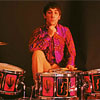Home » Jazz Articles » Album Review » Nik Bartsch's Ronin: Holon
Nik Bartsch's Ronin: Holon
Holon is the second album Bartsch has made with his band Ronin for ECM, following Stoa (ECM, 2006), and is the latest addition to an outstanding body of work previously released on his own Ronin Rhythm Records label. Holon finds a new depth of nuance in Bartsch's music, a more assured to and fro between priapic visceralism and cool melodicism than was apparent before. It's the most holistic realization yet of what Bartsch calls "zen funk" or "ritual groove" music.
Although its extreme rhythmic intensity can make other examples of the genre sound limp-wristed, Bartsch's music could also, more prosaically, be described as "post-minimalist." The key to Bartsch's new-frontier genius has been to take minimalism's layered, repetitive, mathematical structures, in which discrete but complementary melodic and rhythmic motifs are orchestrated in a sequence of subtle micro-evolutions, and add to them the primal beats of rock and funk.
On Holon, as before, Bartsch's right hand is drummer Kasper Rast. The duo have been playing together since they were each 12 years old and have developed a rare singularity. Rast's Lord-have-mercy accents, bombs, crashes and rolls have a live, in-the-moment feel to them, despite being, like everything else Ronin plays, precisely scored by Bartsch.
There are small, but significant, changes to Ronin's instrumentation here. Bartsch plays acoustic piano only, dropping the Fender Rhodes and harnessing the acoustic instrument's overtones. Sha, who played clarinets exclusively on Stoa, is also featured on the alto saxophone, using the more raucous horn to wild, quasi-Moorish effect on "Modul 45."
In his liner notes, Bartsch quotes composer Morton Feldman's observation, "I always leave the concert hall when I start tapping my foot." On Holon, as on his previous discs, Bartsch demonstrates that cerebral focus and physical abandon are not necessarily incompatible. What a glorious revelation, what glorious music!
Tags
PREVIOUS / NEXT
Support All About Jazz
 All About Jazz has been a pillar of jazz since 1995, championing it as an art form and, more importantly, supporting the musicians who make it. Our enduring commitment has made "AAJ" one of the most culturally important websites of its kind, read by hundreds of thousands of fans, musicians and industry figures every month.
All About Jazz has been a pillar of jazz since 1995, championing it as an art form and, more importantly, supporting the musicians who make it. Our enduring commitment has made "AAJ" one of the most culturally important websites of its kind, read by hundreds of thousands of fans, musicians and industry figures every month.




















